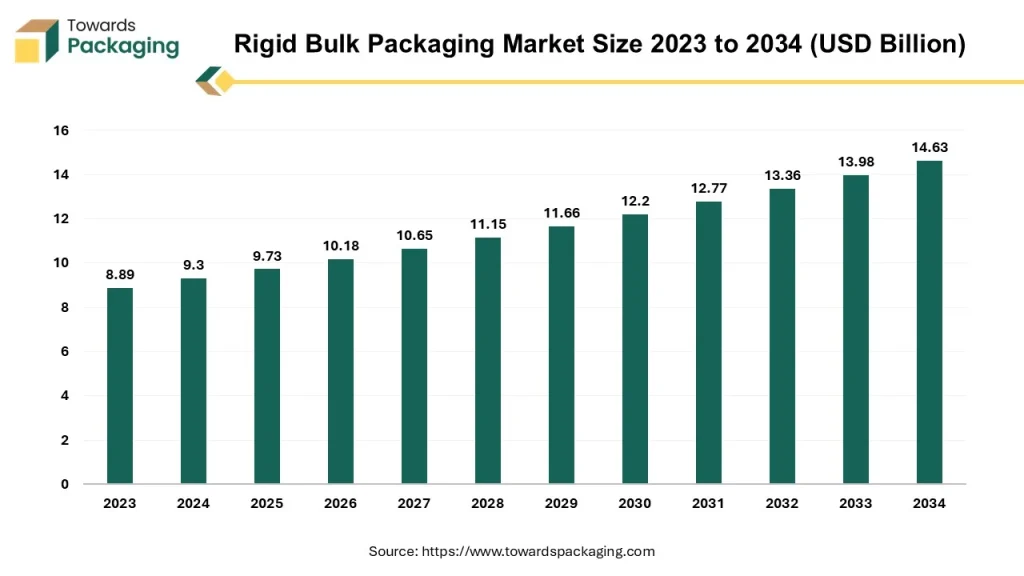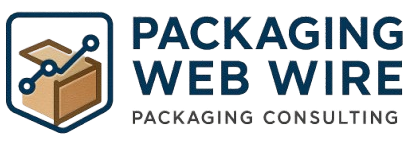The global rigid bulk packaging market is poised for strong growth, rising from USD 9.3 billion in 2024 to an expected USD 14.63 billion by 2033. This reflects a steady compound annual growth rate (CAGR) of 4.63%. The market is driven by rapid industrialization and urban development, especially in emerging economies across the Asia-Pacific region.

What is Rigid Bulk Packaging?
Rigid bulk packaging refers to high-strength containers designed to safely transport perishable, delicate, and volatile goods. These solutions are vital for industries such as food and beverage, pharmaceuticals, and chemicals. Materials like high-strength plastics, metals, and wood are commonly used to ensure durability and security.
Invest in Our Premium Strategic Solution: https://www.towardspackaging.com/download-databook/5201
With a global shift toward more efficient logistics, bulk packaging offers a cost-effective and safe alternative to smaller containers. Its ability to reduce leakage and contamination risks makes it essential in supply chains dealing with sensitive products.
Regional Insights: Asia-Pacific Leads, North America Gains Momentum
Asia-Pacific holds the largest share of the market. This dominance stems from the region’s rapid economic development, urbanization, and infrastructure investment. Emerging economies in the region are experiencing a surge in demand for packaged food, pharmaceuticals, and industrial chemicals.
Meanwhile, North America is the fastest-growing region. The U.S., in particular, boasts strong manufacturing and export capabilities. The country’s demand for standardized, durable, and reusable packaging is growing, especially with the adoption of smart packaging solutions that enhance tracking and logistics.
Get All the Details in Our Solutions – Access Report Preview: https://www.towardspackaging.com/download-sample/5201
Key Market Drivers
Industrial Growth and Urbanization
Industrialization across Asia-Pacific is creating demand for robust packaging solutions. As cities expand and disposable incomes increase, sectors like manufacturing, food and beverage, and pharmaceuticals are scaling up, requiring safe and efficient transport systems.
E-Commerce and Retail Boom
The rise of e-commerce has boosted demand for durable packaging that ensures product protection throughout the supply chain. Rigid bulk packaging, with its ability to resist damage during handling and transit, is a preferred choice for large-scale product movement.
Push for Reusability and Sustainability
Rigid packaging’s reusable nature is aligning with global sustainability goals. Materials like metal, wood, and certain plastics offer recyclable and eco-friendly alternatives that appeal to both businesses and regulators.
Market Challenges
Despite its benefits, rigid bulk packaging faces hurdles. Environmental regulations are tightening globally, especially regarding plastic use. Some countries are banning single-use plastics or mandating offset programs, putting pressure on manufacturers to innovate.
Flexible packaging is also gaining popularity. It takes up less space, is often more affordable, and offers comparable protection for many applications, especially where versatility and low weight are key.
If you have any questions, please feel free to contact us at sales@towardspackaging.com
Segment Analysis
By Material: Plastic Still Dominates
Plastics, including polyethylene and bioplastics, remain the most commonly used material in rigid bulk packaging due to their affordability, strength, and versatility. However, metal and wood are growing in demand as businesses seek more sustainable options. Metal packaging offers better recyclability and longer product shelf life, while wood presents a renewable, biodegradable alternative.
By Product: IBCs Take the Lead
Intermediate bulk containers (IBCs) are the top product segment. Known for their reusability and stackable design, IBCs are widely used to transport liquids and hazardous materials. Their universal design and ease of use make them a favorite in industrial supply chains.
Bulk boxes are also rapidly gaining traction thanks to their durability and branding opportunities. Pails, on the other hand, are preferred in expanding manufacturing sectors for their practicality in transporting semi-solids and powders.
By Application: Food and Beverage at the Forefront
The food and beverage industry holds the highest demand for rigid bulk packaging. Packaging must be hygienic, durable, and able to withstand various environmental conditions. Pharmaceuticals and industrial chemicals also represent key application areas due to their strict safety requirements.
U.S. Market Highlights
The U.S. has a mature and highly regulated market for packaging. Agencies such as the FDA and EPA enforce standards for chemical and food transportation, ensuring product safety and environmental compliance.
American companies are leaders in reusable and smart packaging innovations. Technologies such as RFID and IoT sensors are being integrated into packaging solutions, making them more efficient and traceable.
Major players in the U.S. include:
-
Greif
-
Mauser Packaging Solutions
-
Berry Global
These companies are expanding globally, driving innovation and influencing packaging standards worldwide.
Recent Developments in the Market
-
March 2025: LyondellBasell launched Pro-fax EP649U, a new polypropylene impact copolymer designed for thin-walled injection-molded packaging.
-
May 2024: Amcor PLC opened its Innovation Center in Belgium to focus on sustainable material development.
-
March 2024: Mondi Group merged with DS Smith PLC, creating a packaging powerhouse with a broad geographic reach.
-
October 2022: Amcor introduced a lightweight bottle technology, reducing material use by over 50% and cutting emissions.
Conclusion: Outlook for the Future
The global rigid bulk packaging market is set for robust growth through 2033. Demand is being driven by industrial expansion, sustainability efforts, and a push for supply chain efficiency. While environmental regulations and the emergence of flexible packaging present challenges, the versatility and strength of rigid bulk solutions ensure their continued relevance.
Source : https://www.towardspackaging.com/insights/rigid-bulk-packaging-market-sizing

